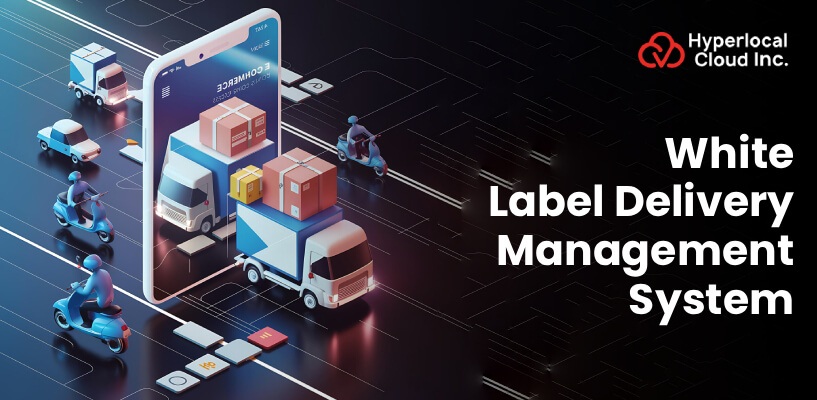White Label Delivery Management System

In today’s world, where digitalization is at its peak, the demand for online goods delivery has become popular. To overcome this concern with technological advancement, a delivery management software has come into the market and has become an important tool for all types and sizes of businesses. Whether it is distributing food, grocery articles, medicines or packages, the platform helps to ensure that the process is smooth, fast and reliable.
Businesses or startups that are looking to boost their business with a competitive approach can build their own delivery management software, even by utilizing a white label solution. By doing this, businesses can start their journey at an initial level with a low cost and in less development time.
The blog will let you know about how you can build a delivery management software with a lot of emerging features, with its revenue-generating models and future trends. Just continue reading.
A Generic Overview of A Delivery Management Solution
A rapidly growing delivery management software is a digital solution that enables customers and businesses to connect, allowing them to receive essential goods quickly and conveniently. From real-time delivery tracking to on-time delivery, the application provides a user-centric approach to the customer. No matter what essential goods customers are looking for, a delivery management software automates the delivery process and delivers the items directly to customers’ doorsteps. Businesses or startups looking to launch their own app to reshape the market can build a delivery app like Uber Eats, etc.
Customize, Brand, and Launch Your Delivery App Today!
Unleash the Effective Working Model of A Delivery Management App
A delivery management app must stand out in meeting the expectations of both users and your business. However, several steps are involved that make the application’s working process efficient. Just review the information below:
1. User Registration
Users are required to create an account on the platform by using their personal details and essential credentials. Once registration is done, users are eligible to place orders for the essential goods.
2. Browse and Order
The option of browsing enables users to search for their desired item or product that they want to order. The feature helps users place orders quickly and hassle-free.
3. Order Processing
Once the order is placed, users will get the option to oversee the order processing. This will inform users of their order status in advance.
4. Delivery Assignment
A delivery partner is assigned to ensure that the order is delivered to the customer’s doorstep without delay or inconvenience.
5. Real-time Tracking
Users are allowed to track their orders in order to know the delivery status of the order. The feature enhances transparency that helps businesses build a strong user base.
6. Payment Processing
Payments can be made through the delivery management system, in which users can select multiple payment options for secure invoicing.
7. Feedback
Users and drivers can both provide their insightful feedback about their overall experience. They are also required to rate each other based on the service they have offered or received.
Advantages of Investing in A White Label Delivery Management Solution
White label solutions are often cost-effective, reliable, and secure, but apart from all this, there is a wide range of benefits that businesses will get while investing in a white label delivery management software solution. Just have a look:
| Factors | Advantages |
| Cost-effectiveness | Reduced development costs and lower upfront investment |
| Speed to Market & Efficiency | Rapid deployment, which means software takes a faster time to market. This, however, will lead to operational improvements. |
| Brand Control & Ownership | Brand customization gives rise to enhanced brand recognition. |
| Scalability and Flexibility | Flexible customization of features, which results in the app growing with your business. |
| Expertise and Reliability | Leverage the expertise of a white label solution provider and get a reliable solution with security and compliance. |
Comprehensive Types of Delivery Management Software
Several types exist, differentiating the delivery management system into various niches. A detailed explanation for the same is precisely discussed below.
1. Food Delivery App
Food delivery apps are created to provide an opportunity for users to order food from a nearby restaurant and have it sent to their door. The food delivery app development company creates an app that usually offers menu prices, estimated delivery time, and tracking options.
2. Grocery Delivery App
These apps grant permission to users to acquire grocery items online within the app. Customers can scroll and find a variety of products. Grocery delivery apps have gained popularity because of their convenience, particularly among engaged people.
3. Fuel Delivery App
Fuel delivery apps allow customers to order fuel and have it delivered directly to their place. These are uniquely workable for fleet businesses or consumers who unexpectedly run out of fuel. Users can fill refills or request urgent situation delivery.
4. Pickup and Delivery App
These apps are more common and are designed for courier services, delivery of personal goods, or even commercial logistics. Customers can ask for pickup, track packages, and confirm delivery. Thus, the pickup and delivery app is in demand due to its flexible services.
5. Meat Delivery App
A meat delivery app development company developed an app that allows customers to order fresh meat, poultry, or seafood and have it transported directly to their homes. These apps prefer to maintain quality, freshness, and hygiene throughout the process.
6. On-Demand App
Delivery apps on request complete different services, including sending documents, moving furniture, and ordering professionals. The flexibility of these apps allows users to ask for almost any, anytime. Startups can directly contact the experienced on-demand app development companies for more details.
7. Medicine Delivery App
Medical delivery apps are important for people who need timely access to prescriptions or medicines without a visit. These apps often require users to upload prescriptions and provide information on dosage and distribution preferences.
8. Cannabis Delivery App
In areas where cannabis is legal, these apps allow users to order products according to all local laws. Age confirmation, product description and legal compliance are the most important parts of these apps. To start your own business, get in touch with a cannabis app development company.
9. Flower Delivery App
Flower delivery apps help customers order fresh flowers for special occasions or gifts. These apps usually provide delivery planning, card messages, and tracking features.
10. Courier Delivery App
A courier delivery app development company built the app to manage package delivery. They include properties such as barcode scanning, delivery confirmation and customer signature.
11. Alcohol Delivery App
An on-demand app for alcohol delivery allows customers to order their desired beer or alcohol for delivery to their homes. These apps assure timely delivery and focus on age confirmation and legal acceptance.
The Impactful Key Features of A Delivery Management App
The application offers several features that are typically useful for users. A feature-enriched platform is often helpful for businesses in order to increase their brand value and ethics. Just look at the information we have mentioned below.
1. User Registration and Profile Management
This feature allows users to register and manage their personal information. Users can easily update their addresses, payment details and preferences.
2. Product Catalog
Customers can scroll through available goods or services. This includes product images, prices, details, and availability.
3. Order Placement
This feature makes it easy to place orders and requires only a few clicks. This involves adding objects to a carriage, confirming the volume, and checking out.
4. Real-Time Tracking
Real-time tracking shows users where their delivery is at any time. It provides self-confidence by offering openness and informs the user about the time of expected arrival.
5. Payment Gateway Integration
To meet shopping needs, the app must support various payment methods, including credit cards, digital wallets, and cash on delivery.
6. Delivery Personnel Management
This feature helps drivers or delivery agents trace the performance and ensures that they follow the right routes.
7. Admin Dashboard
The administrator dashboard is where business owners or managers can monitor operations. This includes order management, user data, delivery logs and more.
8. Loyalty Programs
The loyalty programs offer prizes, points, or discounts to repeat customers, help them retain, and encourage them to use the service again.
9. Analytics and Reporting
This feature helps to track performance, delivery time, word volume, and customer behavior. Companies can use this data to increase their services.
10. Rating and Reviews
After a delivery, users can assess the experience. This answer allows businesses to identify their strengths and regions to improve.
11. Push Notifications
Users are informed about their order status, special offers, or important updates. They help maintain communication and commitment.
12. Order History
Users can see previous orders, see the item again, and check the payment details. It adds function and helps you create confidence.
Unlock New Revenue Streams with White Label Delivery Solutions
Advanced Integrations for A Delivery Management Software
There is a list of advanced integrations for a delivery management software, but the most relevant ones are discussed below.
1. Enterprise Resource Planning
ERP integration helps to connect various business functions, such as inventory, finance, and human resources, and ensures that everything works evenly together.
2. Warehouse Management Systems
WMS integration is useful for companies that manage extensive inventories. It keeps track of warehouses, manages storage, and helps with effective broadcast.
3. E-commerce Platforms
The connection of delivery software with e-commerce platforms such as Shopify, WooCommerce, or Magento enables direct order management from the online store, allowing for seamless integration.
4. AI and Route Optimization Tools
Artificial intelligence can help plan the fastest delivery paths while saving fuel and time. It can also learn from previous orders to predict customer preferences.
5. Carrier and 3PL Integrations
If a business uses third-party logistics (3PL), these integrations help manage deliveries contracted by outward service providers productively.
6. Customer Relationship Management
CRM helps handle customer data, communication, and feedback. It supports personal marketing and better customer service.
Steps to Develop A Delivery Management Software for Small Businesses
To develop a delivery management software, businesses or startups can consider the following steps. Let’s begin:
1. Market Research and Analysis
Before you start, it is necessary to study the target groups and competitors. Understand what customers want and what holes exist in the current market.
2. Define the App’s Fundamentals
Decide on features, target users, delivery types, and platforms (iOS, Android, or web). Make a clear roadmap and accordingly design an idea.
3. Development Process
Businesses can either develop the mobile app from scratch or they can utilize white label solutions to build the application. Both methods have a great impact on the overall cost and the duration of development. However, the cost to develop a delivery management software starts at $5,000, but this can change depending on the development approach you choose.
4. Test and Quality Assurance
Test the app to identify errors, solve problems, and ensure that it works on different devices and operating systems.
5. Deploy and Launch
Once everything is tested and clear, you can start the app on the App Store, Google Play Store, or the corporate website. Market it to attract beginners.
6. Maintain and Regular Updates
Keep the app updated with new features, security updates, and improvements in performance. Collect the user’s answers and make adjustments accordingly.
Utilize the Tech Stack to Build a Delivery Management Platform
A list of tech stacks that are used to build a delivery management platform is mentioned below. Have a look at the information once:
| Category | Tech Stack |
| Frontend | React Native or Flutter, React.js or Angular |
| Backend | Node.js, Python, or PHP |
| Database | MySQL, PostgreSQL, or MongoDB |
| Cloud Services | AWS, Google Cloud, or Azure |
Understand The Future Worth of A Delivery Management App
Today, the demand for online delivery management apps is at its peak, so it is obvious that the popularity will carry forward in the future, with amazing tech advancements. Have a look at the information below and understand how the platform will be valuable in the future.
1. Artificial Intelligence and Machine Learning
Artificial intelligence and machine learning management systems are ready to change the operating method. These technologies allow apps to learn from the user’s behavior, previous orders, and delivery patterns.
2. Autonomous and Smart Vehicles
The future of the delivery may no longer depend on human drivers. With the unrestricted vehicles and drones, distribution actions are expected to become even more automatic. With this, the delivery software can work endlessly 24/7 without any obstacles.
3. IoT Integration
This involves connecting physical devices to the internet to share real-time data. For delivery apps, IoT means immediate notice during temperature control and transportation for sensitive elements such as smart packing of packages, medicines or foods.
4. Sustainable Logistics
Stability is a major focus for both consumers and businesses. Future delivery apps will play an important role in promoting environmentally friendly logistics. Companies can reduce carbon emissions by using EVs.
Explore the Demanding Factors of A Delivery Management Software
Several key factors contribute to the growing popularity of delivery management software in the delivery market. These factors are helpful for delivery management software for small businesses in order to streamline their business operations.
Consumer-centric Demands
1. Real-time Tracking and Transparency
2. Flexible and Fast Delivery Options
3. Seamless Returns and Reverse Logistics
4. Advanced Communication Options
Operational Efficiency and Cost Reduction
1. Cost of Last-mile Delivery
2. Automated Dispatch and Scheduling
3. Data and Analytics
4. Integration with Existing Systems
Business Benefits
1. Compelling Popularity in the Market
2. Sustainability Goals
3. Advanced Technology Integration
4. Scalability
Request a Free Demo of Our White Label Delivery Management Platform Now!
How to make money from a delivery Management Application?
There are so many ways that help businesses generate revenue from the delivery management app. Let’s consider the steps outlined below to achieve a good income with a high ROI.
1. Commission Model
The commission model is one of the most widely used revenue-generating strategies for delivery apps. In this model, the platform earns a certain percentage from each order given through the app.
2. Delivery Fee from Customer
A direct and effective way of making money from customers is a direct and efficient way. This fee can be safe or variable based on distance, delivery time or urgency.
3. Subscription Model
The membership model allows companies or customers to pay regular fees in exchange for premium functions or benefits. This model generates recurrent revenue and builds customer loyalty.
4. In-app Ads
Advertisements in the app are a great way to earn traffic and participation in your app. Local businesses, restaurants, or product brands can pay to view ads on your platform.
5. Data Monetization
As your app collects more data on customer behavior, location, and preferences, that information becomes a powerful business tool. With appropriate user consent and data security policies, you can provide valuable insight to partner companies that want to improve their strategies.
Get a Mobile Application with Hyperlocal Cloud!
Hyperlocal Cloud is a leading software development company that utilizes all the latest technologies to build a robust application. We have established our reputation in the tech world by serving clients worldwide. Our team of expert developers ensures that we build a feature-enriched and advanced delivery management software that successfully meets your business needs. We have expertise in creating mobile applications and websites for various industries and marketplaces. So without even a single thought, partner with us and start your business journey with our valuable insights.





